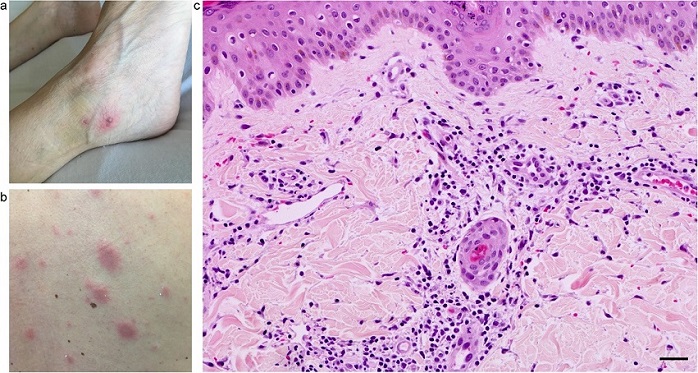European Study Unravels Mechanisms Behind SARS-CoV-2 Induced Vasculitic Skin Lesions
Thailand Medical News Team Aug 13, 2023 1 year, 8 months, 1 day, 6 hours, 14 minutes ago
COVID-19 News: Since its emergence in China, the novel coronavirus SARS-CoV-2 has captivated global attention. Initially characterized as primarily a respiratory disease, extensive research has revealed its impact on various organ systems, including the skin. Unlike internal organs, skin changes can be readily observed and biopsied, offering valuable insights into the virus's effects. COVID-19 patients have presented with a range of skin alterations, from viral exanthema to more complex manifestations such as vasculopathic changes and ischemia. Among these, vasculopathic skin lesions have emerged as a significant concern due to their association with poor prognosis. Recent
COVID-19 News reports and cases studies also show that the incidence of such skin lesions among COVID-19 infected and Post-COVID individuals are rising. However, the underlying mechanisms of this vasculopathy remain enigmatic.
 SARS-CoV-2 related vasculitic skin lesion. (a, b) Clinical images. (c) H&E stained skin punch biopsy from patient’s back. Scale bar 50 μm.
Examining Skin Lesions in COVID-19 Patients
SARS-CoV-2 related vasculitic skin lesion. (a, b) Clinical images. (c) H&E stained skin punch biopsy from patient’s back. Scale bar 50 μm.
Examining Skin Lesions in COVID-19 Patients
Researchers from prominent European institutions, including the University Hospital Tübingen-Germany, University of Lausanne-Switzerland, Medical University of Vienna-Austria, Johannes Kepler University-Austria, and University Complutense Madrid-Spain, embarked on a comprehensive study to unravel the intricacies of vasculopathic skin lesions in COVID-19 patients. Their investigation centered around 25 skin samples collected from patients with COVID-19 related skin lesions. The researchers sought to determine the presence of vasculopathic changes and, in cases of vasculitis, delve deeper into the underlying mechanisms using advanced imaging techniques and immunohistochemistry.
The Complex Nature of Vasculopathy
The study's findings shed light on the complex nature of vasculopathy in COVID-19 patients. Vasculopathy, observed in a significant 76% of COVID-19 related inflammatory skin lesions, manifests as visual endothelial changes. A subset of these cases (16%) presented with leukocytoclastic vasculitis. Of particular interest, electron microscopy and immunohistochemistry analyses unveiled a common thread - extensive spike protein depositions within microvascular endothelial cells. These depositions exhibited co-localization with the autophagosome proteins LC3B and LC3C, hinting at the involvement of autophagy in the development of vasculitis.
Understanding Autophagy's Role
Autophagy, a cellular process involving the degradation of unnecessary or dysfunctional components, has recently gained attention for its potential link to COVID-19 pathogenesis. The study's exploration of autophagy's role in COVID-19 related vasculitis yielded intriguing results. Researchers found a crucial interplay between spike protein deposition and autophagy activation. This connection suggests that the spike protein, rather than direct viral infection, plays a pivotal role in initiating the inflammatory cascade leading to vasculitic skin lesions.
<
br />
The study's insights into autophagy's involvement in COVID-19 vasculitis open new avenues for understanding the disease's pathogenesis. SARS-CoV-2's impact on autophagy pathways and subsequent spike protein deposition appear to trigger an inflammatory response that contributes to endothelial dysfunction. This revelation aligns with the broader understanding of endothelial dysfunction as a key pathology in COVID-19.
Distinguishing Features of COVID-19 Vasculitis
A noteworthy aspect of the study was the distinct immune deposition profile observed in vasculitic COVID-19 skin disease compared to classical leukocytoclastic vasculitis. Notably, the SARS-CoV-2 related vasculitic pattern remained consistent across various skin lesions, regardless of variations in clinical appearance or disease severity. The study's microscopic analysis revealed characteristic features of COVID-19 related vasculitic skin lesions, such as fewer neutrophil granulocytes and distinct inflammatory reactions in the papillary dermis.
Challenging Conundrums
The question of direct viral infection versus spike protein deposition remained a point of contention. While previous studies had suggested the presence of SARS-CoV-2 virus particles in endothelial cells, electron microscopy analyses in this study did not definitively confirm viral particles within the skin. The complexity of distinguishing viruses from cellular structures and the potential timing of sample collection may have contributed to these challenges.
Implications for Future Research
The study's meticulous analysis of COVID-19 related vasculitic skin lesions provides valuable insights into the disease's complexities. By highlighting the role of spike protein-induced autophagy in vasculopathy, the research deepens our understanding of COVID-19's multisystem effects. The findings also underscore the need for further exploration into the interplay between viral proteins, cellular processes, and immune responses. As the scientific community continues to unravel the mysteries of COVID-19, studies like these contribute to a more comprehensive perspective on the virus's impact and inform potential therapeutic strategies.
Conclusion
The study's comprehensive investigation into vasculopathic skin lesions related to COVID-19 sheds light on a previously enigmatic aspect of the disease. By elucidating the connection between spike protein deposition and autophagy activation, the research provides a novel framework for understanding the pathogenesis of COVID-19 related vasculitis. While direct viral infection remains a subject of debate, the study's meticulous exploration of skin samples offers valuable insights into the mechanisms underlying vasculopathic changes. As the global scientific community continues its battle against COVID-19, studies like these play a crucial role in expanding our knowledge and advancing potential treatments for the virus's multisystem effects.
The study findings were published in the peer reviewed Journal of Investigative Dermatology.
https://www.sciencedirect.com/science/article/pii/S0022202X23025010
For the latest
COVID-19 News, keep on logging to Thailand Medical News.
